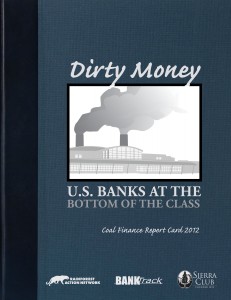 Today Rainforest Action Network and the Sierra Club released our Coal Finance Report Card 2012, our third annual ranking of the largest financiers of mountaintop removal coal mining and coal-fired power plants.
Today Rainforest Action Network and the Sierra Club released our Coal Finance Report Card 2012, our third annual ranking of the largest financiers of mountaintop removal coal mining and coal-fired power plants.
The report looks at the stated policies for mountaintop removal and coal financing from each of the largest US Banks and assigns a letter grade to how well they uphold these policies based on investments, transactions and ownership of coal mining and coal burning utility companies.
In addition, this year’s report debuts the “Filthy Five” — the top 5 largest financiers of the US Coal industry. The list counts the number of transactions each company had with the dirtiest coal-burning utility companies and the largest mountaintop removal mining companies between January 2010 and March 2012.
The Filthy Five are:
- Bank of America: 44 transactions
- JP Morgan Chase: 42 transactions
- Citi: 40 transactions
- Morgan Stanley: 33 transactions
- Wells Fargo: 26 transactions
The report sheds light on how banks with household names are complicit in polluting our air and destroying our natural resources. Mountaintop removal mining is a destructive process where mining companies blow the tops off mountains to reach a thin seam of coal. This practice has damaged or destroyed nearly 2,000 miles of streams and threatens to destroy 1.4 million acres of mountaintops and forests by 2020. In addition, the mining practice destroys Appalachian communities, the health of coalfield residents and any hope for positive economic growth.
Meanwhile, not only is coal burning responsible for one third of US carbon emissions — the main contributor to climate disruption — but it is also making us sick. Coal pollution is responsible for 13,000 premature deaths every year, more than $100 billion in annual health costs and over 200,000 asthma attacks annually. Pollution from coal-fired power plants leads to smog, which can cause chest pain, coughing, and breathing difficulties and can make conditions like bronchitis, emphysema, and asthma worse or even fatal. Today 2 out of every 5 U.S. families live in places with unsafe air.